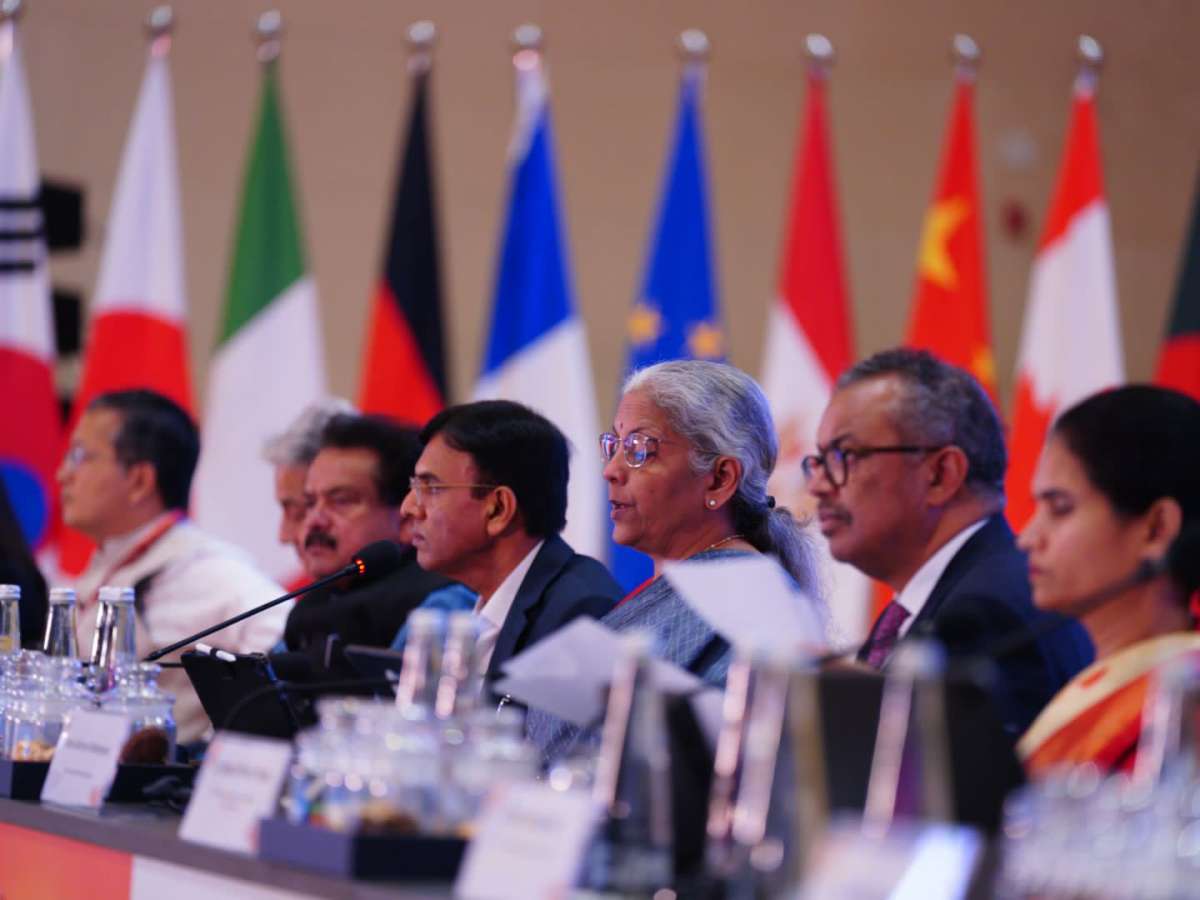The backdrop of the G20 India Presidency resonated with India’s dynamic strides in healthcare. This juxtaposition not only underlines India’s leadership but also offers an academic platform to contemplate the transformative journey that has propelled India as a pioneering force in the medical domain….reports Asian Lite News
In an epoch defined by global collaboration and technological advancements, the G20 Health Ministers’ meeting commenced on August 17, 2023, in Gandhinagar, Gujarat. With over 70 delegates from diverse nations of the G20 participating, this event carried immense significance. Four parallel side events, encompassing Advantage Health Care – India 2023, WHO Traditional Medicine Global Summit, India MedTech Expo 2023, and ‘Sustain, Accelerate and Innovate to End TB in South-East Asia Region’ Conference, further amplify its impact.
A pivotal Joint Finance-Health Ministers’ Meeting on August 19 added gravitas to the proceedings. India’s holistic healthcare model garners admiration as it addresses health and well-being cohesively.
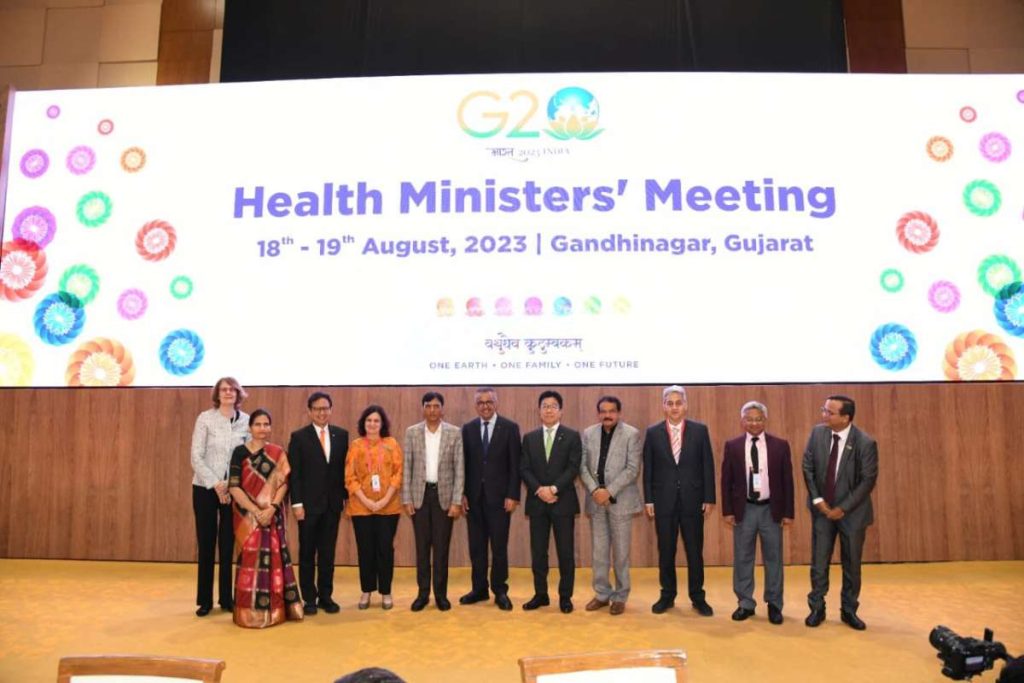
At the core of the G20 Health Minister’s meeting lied an intense dedication to proactive healthcare management. This event organised discussions that span a wide range, from preventing health crises to fostering collaborations within the pharmaceutical sector to ensure widespread access to medical solutions. Moreover, the meeting drove the conversation towards harnessing digital health mechanisms for achieving universal coverage. This dynamic discourse represents a harmonious blend of innovative advancement and equitable healthcare distribution. Continuing this narrative, the G20 Deputies Meeting on August 17 was followed by the G20 Health Minister’s Meeting, spanning August 18-19.
This fluid progression beautifully echoes India’s rise as a burgeoning global medical hub, where the fusion of ideas and collective efforts resonates with the nation’s remarkable strides in healthcare excellence.
The backdrop of the G20 India Presidency resonated with India’s dynamic strides in healthcare. This juxtaposition not only underlines India’s leadership but also offers an academic platform to contemplate the transformative journey that has propelled India as a pioneering force in the medical domain.
The Traditional Medicine Global Summit, hosted by WHO on August 17 and 18, delved into the role of traditional and integrative medicine in global health evolution. In a video message to the G20 Health Ministers’ Meet, Prime Minister Narendra Modi highlighted the pivotal role of health in decision-making, emphasizing international cooperation’s value during the pandemic. Stressing resilience, he urged proactive preparedness to prevent, confront, and counter future health emergencies.
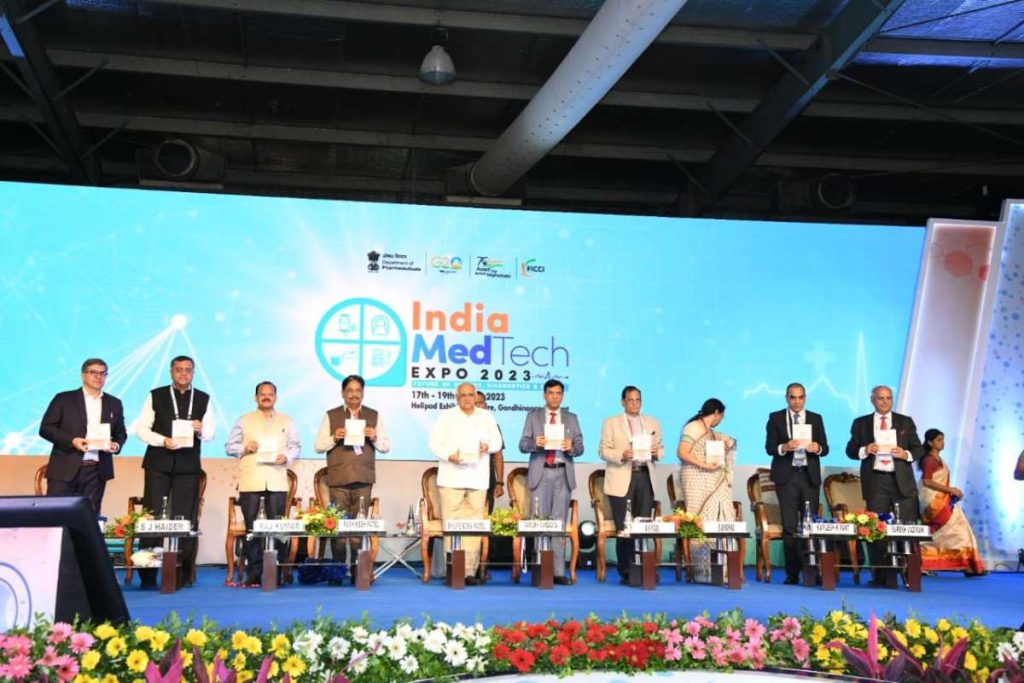
He elucidated India’s holistic approach, extending health infrastructure, championing traditional medicine, and ensuring accessible healthcare. Applauding the WHO Global Centre for Traditional Medicine and the Climate and Health Initiative, PM Modi’s clarion call for open innovation, eliminating redundant funding, and bolstering equitable technology dissemination advanced the journey towards Universal Health Coverage.
At the heart of this remarkable narrative lies the realm of traditional medicine, a domain that embodies the harmonious integration of India’s ancient wisdom and contemporary healthcare imperatives. In a mere span of nine years, India’s progress in traditional medicine has expanded exponentially, growing by an impressive eight-fold magnitude.
The insightful observations of the Union AYUSH Secretary, Rajesh Kotecha, bear witness to this resounding progress. The nation’s robust commitment to healthcare is further exemplified through the establishment of over 12,500 Ayush-based Health and wellness centres, a tangible manifestation of India’s efforts to provide accessible healthcare to its citizens.
The G20 Health Ministers’ meeting under the G20 India Presidency transcends being a mere event, it embodies the convergence of visionary ideas and ambitious aspirations. As India assumes the mantle of G20 Presidency, the symbolism resonates powerfully, marking a historic juncture where the troika is formed by emerging and developing economies -India, Indonesia, and Brazil.
This unique configuration lends a powerful voice to the Global South, emphasizing its growing prominence as a significant contributor to the global healthcare dialogue.
In this context, the G20 Health Minister’s Meeting assumes profound significance, with its key pillars built upon three core priorities that encapsulate the essence of contemporary healthcare dynamics. These priorities encompass prevention, preparedness, and response to health emergencies, with a specialized focus on combating anti-microbial resistance and implementing the innovative One Health framework.
Moreover, the strengthening of cooperation within the pharmaceutical sector takes centre stage, emphasizing the vital aspects of ensuring accessibility, availability, and affordability of medical countermeasures such as Vaccines, Therapeutics, and Diagnostics.
Notably, the third imperative underscores the pivotal role of Digital Health innovations and solutions as vehicles to augment universal health coverage and improve the delivery of healthcare services.
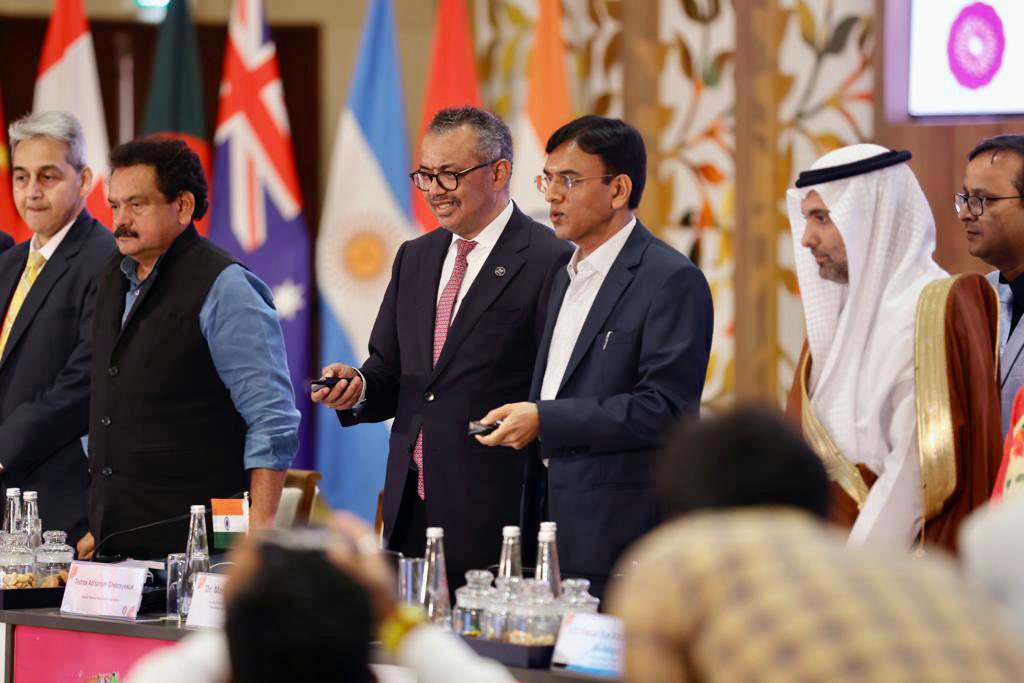
The G20 Health Minister’s Meeting brings together various discussions and deliberations, includes not just the main event, but also a harmonious arrangement of side events that coalesce to enrich the discourse.
The canvas of discussions is painted with events such as the One Earth One Health Advantage Health Care – India 2023, which exemplifies the resonance of global collaborations in building healthcare systems that can endure.
Simultaneously, the India MedTech Expo 2023 serves as a quintessential platform to harness India’s prowess in the Medical Devices sector, poised to redefine the nation as a global MedTech epicentre.
In this dynamic setting, the Ministerial Meeting on ‘Sustain, Accelerate and Innovate to End TB in the South-East Asia Region’ stands as a testament to India’s commitment to tackling formidable health challenges. This initiative, born out of the G20 framework, underscores the urgency of accelerating the fight against Tuberculosis, a persistent global health concern.
The thematic thread that unites these endeavours is the philosophical ethos enunciated by Prime Minister Narendra Modi – ‘One Earth, One Family, One Future.’ This theme, intricately interwoven with India’s principle of ‘Vasudhaiva Kutumbakam’ (The World is One Family), is not just a platitude but a guiding principle shaping India’s vision for a healthier post-pandemic world. The Prime Minister’s words resonate as a clarion call for inclusive, action-oriented, and decisive efforts in the realm of global healthcare.
Embedded within the G20 India Presidency is India’s enduring commitment to amplify the voices of the Global South. This advocacy, infused with the essence of ‘Vasudhaiva Kutumbakam,’ echoes the nation’s determination to channel its influence for collective progress, transcending geographical boundaries. This commitment resonates with the spirit of inclusivity and collaboration that lies at the heart of India’s diplomatic endeavours.
The resonance of G20 India Presidency is further enriched by India’s multifaceted and transformative journey in the medical sector. The meteoric rise of India as a global medical hub cannot be encapsulated in mere statistics; it is an ode to perseverance, innovation, and comprehensive planning.
The healthcare industry’s growth trajectory serves as a testament to India’s aspirations. The compound annual growth rate (CAGR) of 22 per cent propels the industry’s valuation to an astonishing USD 372 billion in 2022. This exponential growth trajectory is poised to elevate India’s global market share from a modest 1.5 per cent to an anticipated 10-12 per cent over the ensuing 25 years, heralding India’s emergence as a pivotal global healthcare player.
In the realm of medical devices, the sector’s anticipated growth to USD 50 billion by 2025 is a direct result of multifaceted initiatives, including the Production-Linked Incentive (PLI) Scheme and the establishment of the National Medical Devices Export Promotion Council.
These strategic interventions not only galvanize indigenous production but also bolster India’s potential to become a leading hub for medical device manufacturing, consequently reducing dependency on imports.
A distinctive hallmark of India’s healthcare domain is the symbiotic coexistence of ancient traditions and modern innovation. Traditional medicine is an integral facet of India’s healthcare ecosystem that complements modern practices, forming a comprehensive bouquet of healthcare offerings. The significance of this endeavour finds profound expression in the Traditional Medicine Global Summit, co-hosted by the World Health Organisation (WHO).
The summit is poised to become a watershed event, convening experts to deliberate on evidence-based knowledge and recent scientific developments in the realm of traditional medicine. The summit’s objective is to bridge the chasm between conventional practices and contemporary advancements through the prism of digital health infrastructure.
Parallel to these transformative strides, India’s burgeoning startup ecosystem in the healthcare sector showcases the fusion of innovation and entrepreneurship.
Noteworthy names such as Endimension, Healthium Medtech, Ykrita Life Sciences, Axio Biosolutions, and Scanray Technologies are illustrative of India’s capacity to cultivate disruptive technologies that hold the potential to revolutionize healthcare delivery.
India’s prowess extends beyond its borders, as it emerges as a preferred destination for medical tourism. Ranked 10th among 46 medical tourism destinations in the Medical Tourism Index of 2021, India’s medical tourism industry is buoyed by its age-old practices of Ayurveda and Yoga.
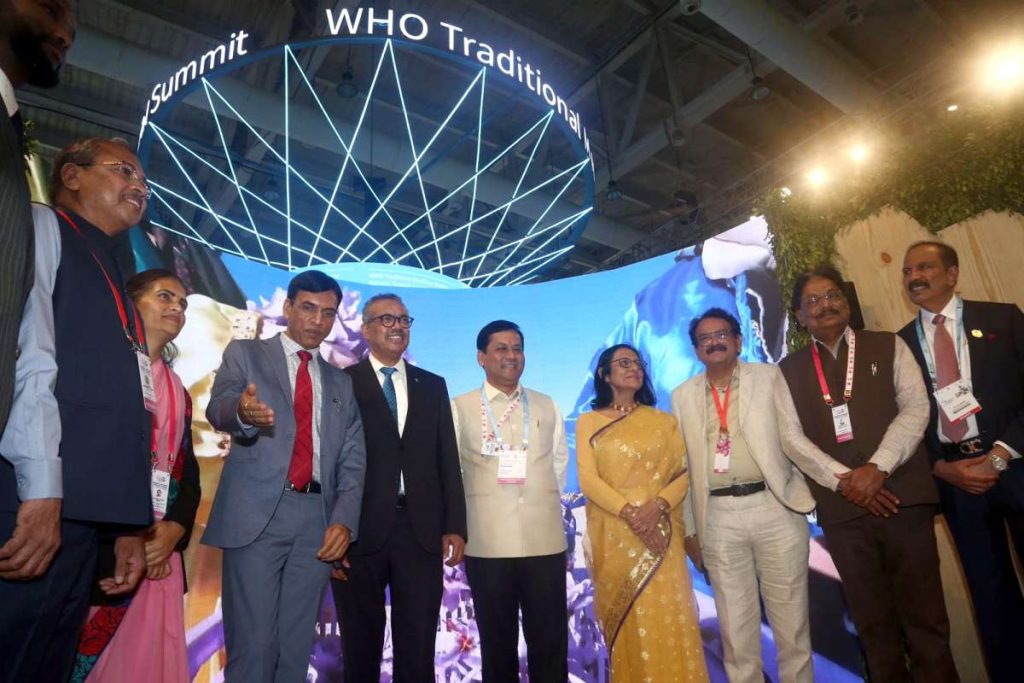
However, the allure transcends ancient traditions; it is the amalgamation of high-quality healthcare, advanced technology, and affordability that places India at the forefront of medical tourism.
A poignant illustration lies in the stark contrast between the cost of a heart bypass surgery in the USA, priced at USD 120,000, whereas in India the same procedure costs a fraction – a mere USD 10,000.
The pharmaceutical sector stands as an indomitable pillar in India’s global ascendancy. Termed as the ‘pharmacy of the world,’ India’s annual turnover of USD 42 billion underscores its role as the largest producer and exporter of generic drugs. The nation’s contribution to global health extends beyond economics; Indian vaccines serve over two-thirds of the world’s children, particularly those from developing and least developed nations.
India’s aspirations are encapsulated in its commitment to the Sustainable Development Goal of Good Health and Well-Being (SDG 3). As it strives towards universal health coverage by 2030, India’s ethos of ‘Vasudhaiva Kutumbakam’ threads through its endeavours. This ethos propels India’s ambition to transform into a global medical hub, rendering healthcare facilities accessible and affordable to all, irrespective of socioeconomic background.
In summation, the G20 India Presidency and India’s emergence as a global medical powerhouse combine to create a complex and intricate narrative. This narrative is built upon the foundations of strong leadership, innovative approaches, and unwavering commitment. The G20 Health Ministers’ meeting seamlessly aligns with India’s ongoing journey of transformation, offering a fertile ground for the exchange of diverse ideas and experiences.
This fusion, guided by the cherished ideals of ‘Vasudhaiva Kutumbakam,’ fosters an environment where global collaboration goes beyond mere words and actively catalyses the healthcare revolution.
As India’s prominence in the medical field continues to rise, it becomes intricately woven into the narrative of the G20 India Presidency, resulting in a harmonious symphony resonating with inclusivity and global advancement. The sentiment, ‘May all be happy, may all be free from illness,’ reaffirms Prime Minister Modi’s vision.
(This article is written by Dr Maheep, a leading analyst of India’s Foreign Policy. He is the Principal investigator of a National Project on India’s Soft Power Diplomacy) (ANI)

